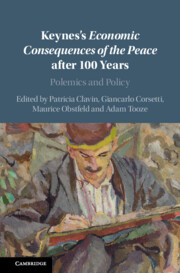Book contents
- Keynes’s Economic Consequences of the Peace after 100 Years
- Keynes’s Economic Consequences of the Peace after 100 Years
- Copyright page
- Contents
- Plates
- Figures
- Tables
- Contributors
- Preface
- Acknowledgements
- 1 Lessons of Keynes’s Economic Consequences in a Turbulent Century
- 2 The Making of a Classic: Keynes and the Origins of The Economic Consequences of the Peace
- 3 Keynes’s Economic Consequences (1919)
- 4 “Too Bad to Be True”: Swedish Economists on Keynes’s The Economic Consequences of the Peace and German Reparations, 1919–29
- 5 Revisionism as Intellectual-Political Vindication, or the French Receptions of Consequences after the Two World Wars (1919–1946)
- 6 Between Cambridge, Paris, and Amsterdam
- 7 Keynes, the Transfer Problem, and Reparations
- 8 The Speculative Consequences of the Peace
- 9 Why Was Keynes Opposed to Reparations and a Carthaginian Peace?
- 10 One Case Where The Economic Consequences of the Peace Mattered
- 11 Keynes and International Trade Politics after the First World War
- 12 Gold, International Monetary Cooperation, and the Tripartite Agreement of 1936
- 13 Exchange Rates, Tariffs and Prices in 1930s Britain
- 14 “Unusual, Unstable, Complicated, Unreliable and Temporary”: Reinterpreting the Ebb and Flow of Globalization
- 15 Keynes’s Arc of Discovery
- 16 Keynes, The Economic Consequences of the Peace, and Popular Perceptions of the First World War
- Index
- Plate Section (PDF Only)
- References
7 - Keynes, the Transfer Problem, and Reparations
Published online by Cambridge University Press: 14 December 2023
- Keynes’s Economic Consequences of the Peace after 100 Years
- Keynes’s Economic Consequences of the Peace after 100 Years
- Copyright page
- Contents
- Plates
- Figures
- Tables
- Contributors
- Preface
- Acknowledgements
- 1 Lessons of Keynes’s Economic Consequences in a Turbulent Century
- 2 The Making of a Classic: Keynes and the Origins of The Economic Consequences of the Peace
- 3 Keynes’s Economic Consequences (1919)
- 4 “Too Bad to Be True”: Swedish Economists on Keynes’s The Economic Consequences of the Peace and German Reparations, 1919–29
- 5 Revisionism as Intellectual-Political Vindication, or the French Receptions of Consequences after the Two World Wars (1919–1946)
- 6 Between Cambridge, Paris, and Amsterdam
- 7 Keynes, the Transfer Problem, and Reparations
- 8 The Speculative Consequences of the Peace
- 9 Why Was Keynes Opposed to Reparations and a Carthaginian Peace?
- 10 One Case Where The Economic Consequences of the Peace Mattered
- 11 Keynes and International Trade Politics after the First World War
- 12 Gold, International Monetary Cooperation, and the Tripartite Agreement of 1936
- 13 Exchange Rates, Tariffs and Prices in 1930s Britain
- 14 “Unusual, Unstable, Complicated, Unreliable and Temporary”: Reinterpreting the Ebb and Flow of Globalization
- 15 Keynes’s Arc of Discovery
- 16 Keynes, The Economic Consequences of the Peace, and Popular Perceptions of the First World War
- Index
- Plate Section (PDF Only)
- References
Summary
War reparations have been a common feature in peace settlements for thousands of years. The chapter provides an overview of how historical reparations were paid, and then an overview of the literature on the transfer problem, one hundred years after Keynes started the debate. Whether direct transfers of money or indirect transfers of assets, transfers affect trade flows and future income in the short or the long run. Financing a transfer is a budgetary problem in the short run, and if a country can borrow the money, the constraint is a willingness to pay, not the capacity to pay. But a transfer can also have second-order effects on savings, investments, consumption, and output, because interest rates or the terms of trade might mitigate or exacerbate the economic costs of the transfer. I show that the terms of trade, for the most part, improved in the years following the announcement of reparations, and that sovereign debt markets allowed countries to finance reparations by borrowing.
Keywords
- Type
- Chapter
- Information
- Keynes's Economic Consequences of the Peace after 100 YearsPolemics and Policy, pp. 179 - 201Publisher: Cambridge University PressPrint publication year: 2024

